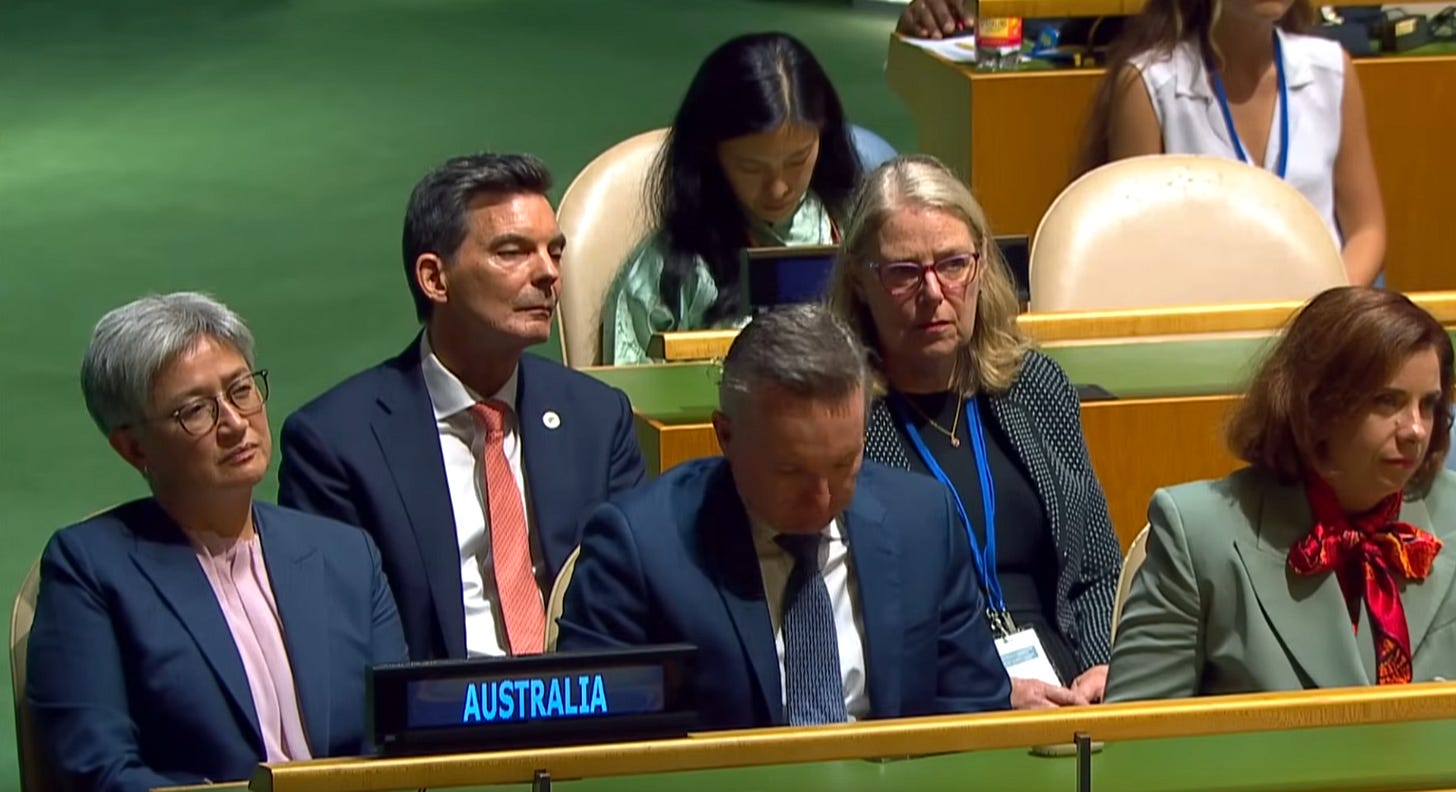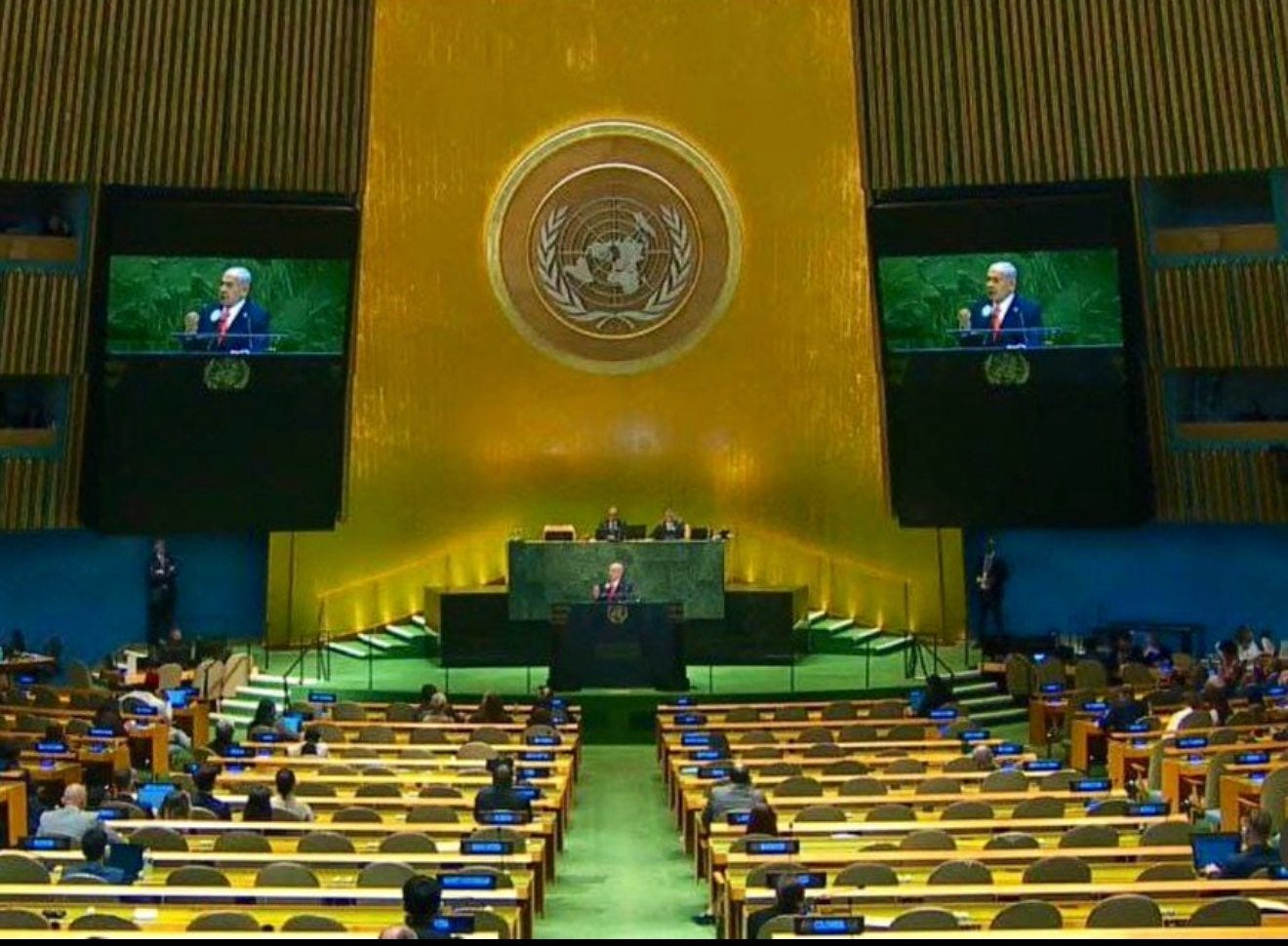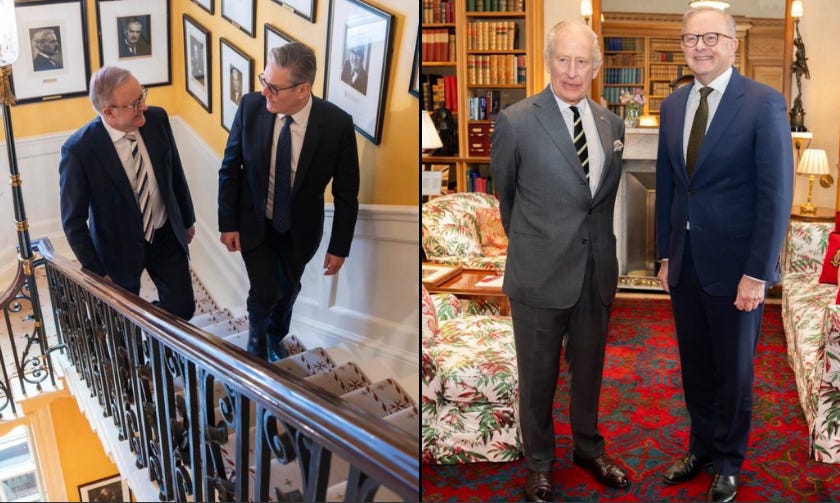Australia lost in a sea of UN-certainty
The Australian delegation was on an outdated autopilot at the most consequential UN General Assembly in recent times.

When Benjamin Netanyahu reached the podium at the 80th UN General Assembly, representatives from over fifty countries left the room in protest. By the time the Israeli Prime Minister opened his mouth, he was speaking to a largely empty hall, at a tense time in history within an organisation marked by tension. The UN General Assembly hall was filled with a palpable tension, the people that filled its halls in a state of flux, among the chaotic scenes was an Australian Prime Minister claiming to represent Australia’s national interest on the world stage.
The Israeli Prime Minister’s speech was surreal. “Israel is doing the dirty work for all of us”, lunged forth Netanyahu, who sporadically went from reminiscing on the diabolical alleged mass pager attack it committed in Lebanon to making strange connections to the Holocaust. “Did the Nazis ask the Jews to leave? Kindly leave? Did they say get out so we can come in, of course not”, barked a frustrated Netanyahu to a crowd of the compromised who remained, not enough to make a difference to the crumbling Israeli narrative. As the nations of the world were turning their backs in protest, in Gaza there were no such option to opt out. Telephones were hacked to forcefully broadcast the discombobulated tirade from Netanyahu, along with loudspeakers blasting out the speech into the rubbled streets - but just like the few that remained in the hall - the Palestinians in Gaza were not the intended audience. The intended audience was no longer there.

What preceded Israel’s notorious appearance in the crucible of nations were iconic speech and powerful sermon in condemnation of the nation who dared to front up and try to tell the world what it is doing in Gaza was anything other than what it is. The hubris of Netanyahu was obliterated by the fiery eyes of the nations of the world, gathering at an organisation strong in consensus that Israel’s actions constitute a ‘genocide’, and the 80th UN General Assembly took a life of its own. President Petro of Colombia announced a proposal for a UN protection force to stop the genocide in Palestine, ‘Enough words’, he said in an impassioned speech, urging armed UN intervention to end the Gaza genocide. Chile’s President Gabriel Boric drew a parallel between Gaza and the Holocaust, Indonesian President Prabowo pledged 20,000 troops, and the consensus of the world from Turkey to Norway repudiated Israel in clear unanimity. Something significant was occurring at the assembly, as the tide of global opinion against Israel finaly manifested in the assembly hall.
Oblivious to the tectonic shift happening around him, Donald Trump deep in an ‘Emperor’s New Clothes’ scenario, defaulting to all the obnoxiousness he could muster, talking about faulty escalators and berating ‘malfunctioning’ teleprompters, before the aspiring Nobel peace prize laureate addressed the UN with a simple message that defined the US contribution to the assembly, “I’m really good at this stuff. Your countries are going to hell.” And among this chaos, while the new Syrian leader (who cut his teeth blowing up cars on the streets of Baghdad for Al Qaeda before he joined ISIS) was doing talks with US liberal think-tanks (in New York!), and Netanyahu was giving flustered comparisons on what the Nazis did that Israel didn’t, insert Australian Prime Minister Anthony Albanese, who managed to get a blurry selfie next to the Donald Trump. A proof of life perhaps.
Albanese looked like ‘Darryl Kerrigan goes to the United Nations’, just seemingly going on the vibe of it all. Amid this planet in flux, between the tectonic shifts threatening to break the fragile world order, Anthony Albanese stood to make his two cents worth - but all he could really manage were too many selfies with the Anglosphere. As each photo revealed a hollow moment and a missing arm from our Prime Minister who too most of the photos, you couldn’t help but notice every thing moving at a different pace around him.
As world leaders were delivering polemic speeches condemning Israel’s war on humanity, there was no rousing speech from our Prime Minster, who lobbed up on the podium and talked some Kieran Perkins 1992 shiny-gold version of Australia that’s been coughed up by every less impressive politician at subsequent UN assemblies every year since. He regurgitated messages that we’ve tricked the world to believe: that we are paragons of international law when we maintain economic, military and diplomatic normalcy with Israel, that we lead climate action when we are one of the biggest polluters - that we mean what we say when we don’t really mean what we say at all.
Truth is, Australian Labor government leaders have been dragged kicking and screaming to their decision in recognising Palestine, and their lethargy reflects decades of bipartisan bad faith contribution towards global forums on climate, conflict and the adherence of international law. The ‘Green and Gold’ lustre is no longer seen by our international neighbours. The world is in peril, and tilting on its axis, it’s jarring to see our leaders defaulting to a world that doesn’t exist anymore, looking for safety from those who are not whom they used to be, and being torn between the antiquated moorings of crumbling legacy infrastructure and a rapidly changing modern reality.
The PM returns home, via another trip to the UK with another set of selfies with the most unpopular Labour leader in history, none the wiser about the fate of his country, and unable to read through the brand-new tea leaves at the base of his legacy teacup. After what could be seen as an essentially worthless recognition of a state Israel has vowed openly to prevent existing, Albanese thought it was a good idea to put his endorsement behind Tony Blair, architect of the Iraq war, as a great candidate to be the warlord who oversees a future redevelopment in Gaza. And unbeknown to himself, or maybe by design, the ALP under Albanese is drifting further towards a UK Labour model, one that claims to have no “left hat or right hat” when making major decisions.
When those ‘major decisions’ involve a half-a-trillion dollar AUKUS submarine ghost fleet, subsidising the UK nuclear industry, deciding to supply military components to Israel, and acquiescing to Trump’s increasingly horrifying view of the world, Albanese’s centre feels like a sovereign death sentence and a moral abrogation due to a political cowardice and a lack of good ideas.
The week before he left for the UN, Albanese went over to Papua New Guinea about a defence pact and couldn’t come home with much more than a communique. Labor’s name is mud in the Pacific over diplomatic doublespeak and dis-ingenuousness not too dissimilar to its predecessor- and with Australian foreign policy imperatives so skewed with our important South-East Asian neighbours, if you take a second to read the room, its not hard to realise that Australia has become a regional pariah. Grainy selfie aside, the PM’s teledex is limited, along with his country’s influence, and his inability to act pragmatically in the national interest reflects a decades old national political culture entrenched in Canberra, a culture that seems noticeably ineffective at the UN.
Australia pretends that it’s got a seat at this table but it’s really got a bipartisan record of supporting war in foreign countries, aggressive manoeuvres that impact the safety of our own region, and berating our neighbours because they don’t do things we like. Our presence at a revolutionary edition of the UN General Assembly reflected that. Our global reputation is at such a low point that we now struggle to break bread with our ‘Pacific Family’, and rather than take stock of this, we have a leader who prefers photo albums with Kier Starmer, rather than thinking hard about creative national ideas in the sovereign interest, and engaging in the hard work to convert them into policy.
The Albanese government has failed with its response to Israel and Gaza, damaging Labor’s legacy, and going at odds with the Australian people to do so. Its belated and token recognition of Palestine, combined with the vapidity of the Prime Minister’s UN address, has failed to capture the vibe among the nations of the world and, more importantly, the people at home. The failure of our political class to recognise the significance of the rapidly changing world on the world stage is also their failure to represent the true reflection of the Australian people at home – and as the world’s moral compass shifts, Albanese’s Australia dances to an outdated tune, while others take their seats, watching us falter.



Thanks, Joel. Pieces like this are maddening because they show how far we’ve drifted from our better selves. Australia used to have flashes of genuine international leadership: Evatt shaping the UN Charter and the UDHR, Gareth Evans driving the Cambodia peace process and pushing Responsibility to Protect. At our best, we were a creative middle power: building bridges, championing multilateralism, occasionally punching above our weight for something bigger than trade or security deals.
Compare that to the Albanese photo-op era. Our UN presence now looks like a karaoke version of diplomacy: recycled talking points, desperate alignment with Anglosphere moods, and a refusal to call genocide by its name. It’s not just embarrassing, it’s strategically suicidal; shrinking our influence while the world realigns around us.
Australia’s foreign policy shines when it’s bold, independent, and principled. Right now, it’s timid, derivative, and hollow. We’ve gone from helping draft the rules of the game to mumbling along while others tear up the rulebook.
Good piece, Joel. 'Something significant was occurring at the (UNG) assembly, as the tide of global opinion against Israel finally manifested in the assembly hall.' Bravo to Colombian President Gustavo Petro and Prabowo Subianto for promising to support an international armed intervention to end Israel’s nearly two-year genocide in Gaza. We might hope that some ethically minded European Nations would join these leaders, and ensure multi-regional support for human rights and global peace law. When the UN's RtP doesn't want to use the power on a genocidal apartheid Nation, just because it's backed by US imperialism (or because it's white), we have a global war crime enforcement problem. I don't expect the USA, Germany, UK, and the Anglo colonies to sever all diplomatic ties, but following Uncle Sam and Auntie Britain in supplying arms to a genocide is just not acceptable in this or the previous century, it's time to bid Greater Israel (2020s crusader Vaterland) goodbye, and send the ringleaders to the ICC.